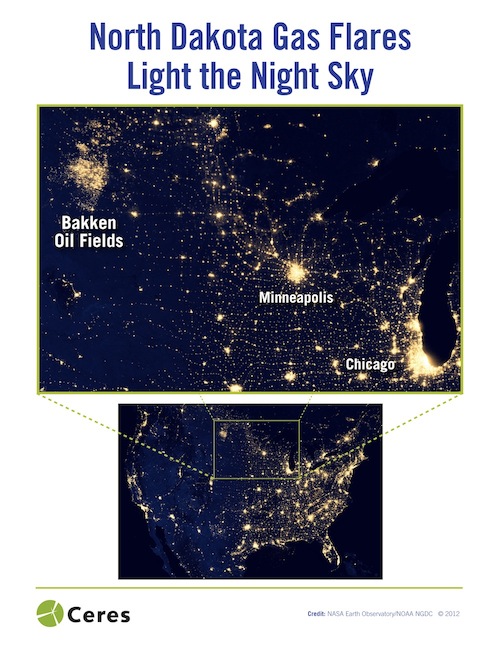Investors Press Continental Resources to End Wasteful Flaring of Natural Gas
Large Oil Developer Burns Off Natural Gas as Other Firms Set Flaring Reduction Goals
Published 01-10-13
Submitted by Ceres

The rapid growth in domestic oil production has set the United States on track to become the world’s top oil producer by 2015, but investors are wary of the environmentally damaging practices associated with that growth, specifically the burning off – or flaring – of natural gas that is produced as a byproduct from oil wells.
In North Dakota’s Bakken shale region, widespread flaring across millions of acres lights up the night sky, burning off enough energy each day to heat half a million homes. Flaring is also prevalent in other key shale regions, like Texas’s Eagle Ford. Excessive flaring of natural gas affects regional air quality and creates significant greenhouse gas emissions that investors are seeking to reduce.
Acting on that concern, Mercy Investment Services, Inc. has filed a shareholder resolution with Continental Resources, Inc., a major Oklahoma-based oil developer operating in the Bakken, requesting that the firm “adopt quantitative, company-wide goals, based on current technologies, for reducing or eliminating flaring in all operations and facilities under the company’s financial or operational control.”
“Flaring poses financial, operational, and reputational risks to Continental, and is a potential threat to its license to operate,” the resolution reads. Furthermore, the resolution contends that gas can be captured economically: “Due to the relatively high liquids content in Bakken gas, flaring in this region represents substantial forgone revenue.” Unless Continental acts on this resolution, shareholders will vote on its recommendations at the firm’s annual meeting, usually held in June.
“The flaring of natural gas is a tremendous economic waste, and it threatens oil developers’ license to operate, as well as the environment,” said Pat Zerega, director of shareholder advocacy at Mercy Investment Services, the lead filer of this resolution. “Numerous Sisters of Mercy, as well as myself, live in areas of Pennsylvania and New York affected by flaring from shale gas operations, and our concern over the environmental impacts of flaring continues to grow. Continental should focus on eliminating this wasteful practice.”
The domestic oil industry’s practice of allowing billions of cubic feet of natural gas to be flared or vented is only loosely regulated at the state level, and growing domestic oil development has propelled the U.S. into the top 10 gas flaring countries globally along with Russia, Nigeria, and Iraq. Flaring is of particular concern in North Dakota, where the number of producing oil wells grew 21 percent between January 2012 and October 2012, according to the North Dakota Industrial Commission.
In its most recent report on oil production, the state’s Commission also noted that while “the high liquids content makes gathering and processing of Bakken gas economic” and “additions to gathering and processing capacity are helping,” at least 30 percent of this gas continues to be flared. Given the rapid growth of oil production in the region, these estimates may lag behind actual flaring levels.
The shareholder resolution cites two firms that are taking action on flaring: Hess, which achieved a five-year target of 50 percent flare reduction in two foreign countries, and Whiting Petroleum, a firm with a stated a goal of zero flaring-related emissions.
“Even with lower natural gas prices, there is no reason that oil developers in the Bakken should be burning off a fuel that their colleagues in the Marcellus region are working to capture. It’s simply bad practice, and it is making domestic oil a particularly high-carbon source,” said Andrew Logan, director of oil and gas program at Ceres. “Ceres has been working with the oil industry to eliminate its most wasteful and environmentally harmful practices. Flaring can be reduced to essentially zero, and the industry should hold itself accountable to achieving this goal.”
This shareholder resolution adds to growing investor concern over flaring. In March 2012, Mercy Investment Services and other investors representing $500 billion in assets sent a letter to 21 of the industry’s largest shale oil producers, including Continental, urging them to reduce or eliminate flaring. The signatories of the letter included F&C Asset Management, Boston Common Asset Management, Local Authority Pension Fund Forum, PaxWorld Management, Portfolio 21 Investments and Presbyterian Church (USA), among others.
Ceres coordinates annual shareholder filings on a range of sustainability issues. Additional examples of Ceres’s work with shareholders can be found in Investor Power, a publication highlighting action on palm oil, hydraulic fracturing, the homebuilding sector and the electric power industry.
About Ceres
Ceres is an advocate for sustainability leadership. Ceres mobilizes a powerful coalition of investors, companies and public interest groups to accelerate and expand the adoption of sustainable business practices and solutions to build a healthy global economy. Ceres also directs the Investor Network on Climate Risk (INCR), a network of 100 institutional investors with collective assets totaling more than $11 trillion.
For more information, visit http://www.ceres.org.

Ceres
Ceres
Our Mission: Ceres is transforming the economy to build a just and sustainable future for people and the planet.
Ceres is a nonprofit organization working with the most influential capital market leaders to solve the world’s greatest sustainability challenges. Through our powerful networks and global collaborations of investors, companies, and nonprofits, we drive action and inspire equitable market-based and policy solutions throughout the economy to build a just and sustainable future. For more information, visit ceres.org and follow @CeresNews.
More from Ceres

